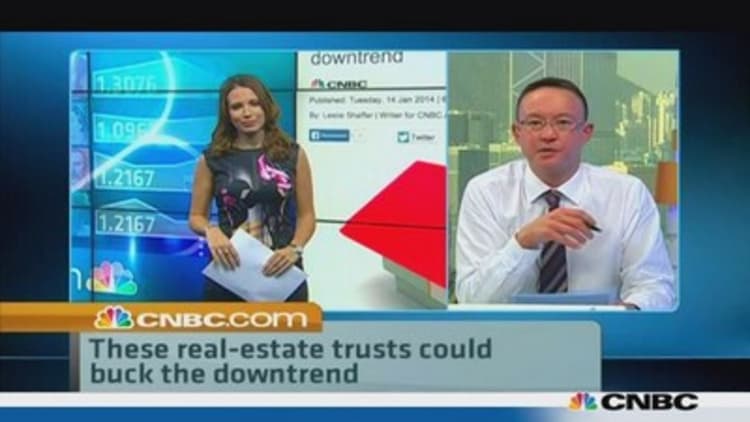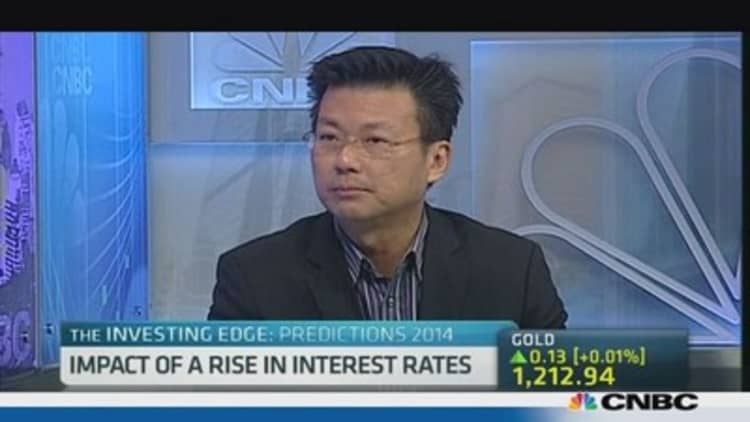
While the prospect of rising interest rates has dampened demand for real estate trusts globally, the sector could see a resurgence in Australia, Morgan Stanley said.
Interest rates have headed higher since the U.S. Federal Reserve last year first broached its plan to taper its asset purchases. Rising rates hurt interest in real-estate investment trusts, or REITs, as their yields become less attractive and they face a more difficult financing environment for acquisitions.
(Read more: 2014 a 'litmus test' for Australia economy: Goldman)
"In a rising interest rate environment, you want to be very skeptical and nervous about bond proxies," like REITs, Richard Titherington, head of global emerging markets at JPMorgan Asset Management, told CNBC last week.
But in Australia, interest rates may not be headed north.
"So far, Australian bond yields have risen in line with global bond yields," Morgan Stanley said in a note. "However, if Australian bond yields stabilize or fall as the RBA (Reserve Bank of Australia) keeps rates lower for longer (as is our macro view), it would be positive for the A-REIT sector."
Morgan Stanley isn't the only one expecting lower rates. Goldman Sachs this week said it expects Australia's economic growth will slow to 2.0 percent in 2014 from an expected 2.5 percent in 2013. As a result, Goldman is forecasting the Reserve Bank of Australia (RBA) is more likely to cut interest rates than raise them this year, expecting a 25 basis point rate cut in March.
(Read more: Singapore's real-estate trusts fall out of favor)
With the gap between A-REIT (Australian real estate investment trust) yields and the 10-year bond yield already above average, a decline in bond yields could spur "significant" outperformance in A-REITs, both compared with the broader Australian stock market and the global REIT sector, Morgan Stanley said.
The bank also sees a possibility that international REITs may take advantage of recent Australian dollar weakness to acquire assets.
"Interest from international REITs in the Australian property sector has been close to zero in the last five years or so, as fundamentals were weak, the high Australian dollar made investments less attractive, and companies were generally focused on their domestic markets," it noted.
(Read more: Real estate funds no longer living on Easy Street)

But now the Australian dollar is around 15 percent off its highs, Morgan Stanley noted, expecting it will decline further over the next six to 12 months. In addition, A-REITs also tend to trade at a discount to their U.S. and European counterparts, it said.
"As the Australian dollar weakens, fundamentals improve, and industry consolidation intensifies, we could see cross-border M&A activity pick up," Morgan Stanley said.
To be sure, it's not entirely clear this scenario will play out.
While falling interest rates would theoretically be good for property yields, "in U.S. dollar terms, I'm not convinced that would be the case," said Tim Gibson, head of property equities in Asia at Henderson Global Investors. "If they're expecting interest rates to be cut, you can expect the currency to fall further. You'd have to be a wee bit careful about the currency."
(Read more: US dominates list for foreign real estate investors)
Gibson also isn't certain international companies will target Australian property assets. European and U.S. REITs' "investors are not going to thank them for moving overseas. It introduces another currency risk," he said. "I'm not convinced the growth prospects of Australia are any better than they are in the U.S."
Some Asian buyers could emerge and some sovereign wealth or pension funds may want to buy into the Australian market, he said.
But he added, "Finding product and actually executing is difficult. It's not the biggest, most liquid market out there."
— By CNBC's Leslie Shaffer. Follow her on Twitter: @LeslieShaffer1

